Heart Truths: Is It a Health Hack—or a Heart Hurt?
Small “hacks”—creative ideas that help you change habits—can lead to big improvements in your heart health. When you make the right changes, that is.

“People say ‘old habits die hard’ and ‘you can’t teach an old dog new tricks,’ but I see patients change habits all the time, with the right motivation and when done effectively,” says Johns Hopkins cardiologist Bill McEvoy, M.B., B.Ch., M.H.S. “And in the case of behaviors like quitting smoking, health improvements can be very quick.”
But not every heart-health shortcut pays off. See if you can guess which of the following health hacks really work for your heart health.
Can E-Cigarettes Help You Quit Smoking?
No. “Unfortunately, there’s no good, consistent evidence that electronic cigarettes help smokers quit traditional tar cigarettes,” McEvoy says. “In addition, there’s concern that chemicals in the vapors can have harmful health effects.”
The same is true for other swaps popular among smokers, such as using a hookah (water pipe) or switching to cigars. A better way to go, McEvoy says: Call the toll-free nationwide 1-800-QUIT-NOW helpline. You’ll get connected to resources such as counseling, support, and advice about medications approved to help you kick the habit.
Can Snacking on Energy Bars Help You Lose Weight?
Maybe. Make that a big, qualified maybe. Eating “meal replacement snacks”—such as protein shakes and energy bars—can actually make people eat more and exercise less, recent research has found. Part of the trouble comes from a misperception that simply eating a food labeled “healthy” means you don’t need to exercise. Also, many such snacks are highly processed and less helpful for weight loss than eating whole natural foods.
“You need to read labels carefully to know what you’re taking in,” McEvoy says. “Check the Nutrition Facts to see exactly how much sugar, sodium and saturated fat are in the snack. So-called health bars are no replacement for real heart-healthy foods and exercise.”
Try It Want to Make Heart-Healthy Changes? Use the Five A’s
Doctors use an informal plan called the Five A’s to help patients make changes, says Johns Hopkins cardiologist Bill McEvoy, M.D., B.Ch., M.H.S. Try using it as a starting point in conversations with your doctor:
Ask: Talk about a behavior you’d like to change.
Advice: Get input on how to do so.
Assess: Set goals for when to check progress.
Assist: Figure out what kind of help is needed to make it happen.
Arrange: Find resources (a gym, 1-800-QUIT-NOW, etc.).
Can Wearable Fitness Trackers Help You Get Fit?
Yes. “Wearables are very exciting,” McEvoy says. Activity trackers aren’t just trendy gimmicks. There’s emerging evidence that the feedback these devices provide about your exercise progress can motivate you to try harder and keep with an exercise program longer, he adds.
Can Vitamin Supplements Provide a Heart-Healthier Diet?
No. Supplements aren’t regulated the same way that pharmaceutical drugs are, so advertising can be misleading and consumers can’t always be sure what they’re getting, McEvoy says.
The very best way to get the nutrients your heart needs is to follow a heart-healthy Mediterranean diet, featuring a rainbow’s worth of fruits, vegetables and other plant foods, which are the best sources of antioxidants and vitamins you can consume.
Can You Make Up Sleep on the Weekends?
No. It’s a myth that you can “catch up” on lost sleep during the weekend. What’s true, however, is that added sleep is beneficial to heart health.
You can make easy tweaks to give yourself better-quality sleep throughout the week: Keep your TV and laptop out of the bedroom so you’re not tempted to rob yourself of sleep with work or YouTube videos. Go to bed and get up at a consistent time every day.
Can Setting Small Goals Help You Get Healthy?
Yes. Sometimes a big goal can seem impossible. But if you break it into smaller intermediate goals, you’re more likely to reach them and be fueled to bigger successes. “This is another area where tracking devices—whether for exercise, diet or even smoking—might help motivate people to make manageable, healthy changes,” McEvoy says.






